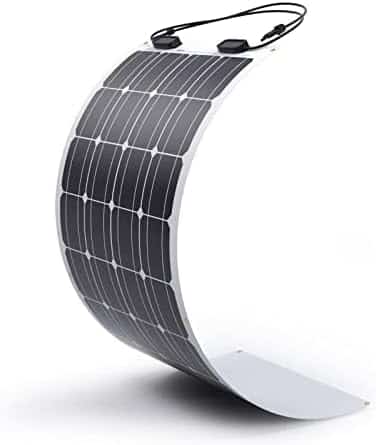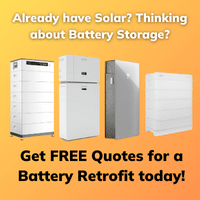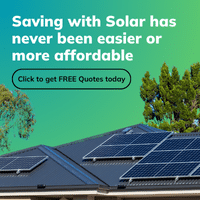Australia’s commitment to sustainable energy solutions has paved the way for innovative technologies, and flexible solar panels are emerging as a remarkable player in the nation’s renewable energy landscape. Flexible solar panels are rapidly gaining popularity in Australia, offering a promising blend of efficiency, versatility, and environmental benefits.
Energy Matters has been a leader in the renewable energy industry since 2005 and has helped over 40,000 Australian households in their journey to energy independence.
Let us discuss and choose the best quote that suits your needs and budget, and we can connect you with our trusted local installers, who will provide up to 3 FREE quotes for your home and business solar energy system.
What are flexible solar panels?
Flexible solar panels represent a breakthrough in solar technology. Unlike traditional rigid solar panels, which are made from crystalline silicon cells, flexible panels are manufactured using thin layers of photovoltaic materials. These materials can include amorphous silicon, cadmium telluride, and copper indium gallium selenide. The resulting panels are lightweight, bendable, and adaptable to various surfaces, making them highly suitable for diverse applications. Flexible solar panels are ideal for limited weight and space applications, such as on boats, RVs, and other mobile vehicles.
Thin film solar panels: Flexible but not all flexible solar panels
Thin film solar panels are a type of photovoltaic (PV) technology that uses a thin layer of semiconductor material to convert sunlight into electricity. They are typically much thinner than traditional crystalline silicon solar panels and can be made from various materials, including amorphous silicon, cadmium telluride, and copper indium gallium diselenide (CIGS).
While all flexible solar panels are thin-film solar panels, not all thin-film solar panels are flexible. Some thin-film solar panels, such as those made from crystalline silicon, are rigid and cannot be bent. In Australia, the most common type of thin-film solar panel is CIGS, which is flexible and can be used in various applications.
Feature | Thin-film solar panels | Flexible solar panels |
Material | A variety of materials, including amorphous silicon, cadmium telluride, and copper indium gallium diselenide (CIGS) | Naturally flexible materials, such as plastic or metal foil |
Thickness | Typically much thinner than traditional crystalline silicon solar panels | It can be very thin, even as thin as a sheet of paper |
Flexibility | Not flexible | Flexible, can be bent or rolled without breaking |
Applications | Suitable for a variety of applications, including rooftops, ground mounts, and off-grid systems | Ideal for applications where weight and space are limited, such as on boats, RVs, and other mobile vehicles |
What is the difference between flexible panels and rigid solar panels?
Flexible solar panels and rigid solar panels are both viable options for generating solar power in Australia. Flexible panels are lighter and more flexible than rigid panels, making them easier to install on curved surfaces or in areas with limited space. They are also less likely to be damaged by wind or hail. However, flexible panels are typically less efficient than rigid panels and may not last as long.
Rigid solar panels are more efficient and durable than flexible panels but are heavier and more difficult to install. They are best suited for applications where efficiency and longevity are more important than weight and flexibility.
Ultimately, the best type of solar panel for you will depend on your specific needs and budget. If you are looking for a lightweight and flexible panel that is easy to install, a flexible solar panel may be a good option. A rigid solar panel may be better if you need a more efficient and durable panel.
Feature | Flexible Solar Panels | Rigid Solar Panels |
Efficiency | Typically less efficient | Typically more efficient |
Durability | Less durable | More durable |
Weight | Lighter | Heavier |
Flexibility | More flexible | Less flexible |
Cost | Typically less expensive | Typically more expensive |
Best use cases | Applications where weight and flexibility are important, such as RVs, boats, and solar tents | Applications where efficiency and durability are important, such as solar farms and rooftop installations |
Read more about the best of solar panels
Benefits of flexible solar panels
Versatility
One of the most significant advantages of flexible solar panels is their adaptability to different surfaces and environments. They can be integrated into curved or irregular surfaces, such as rooftops, vehicles, backpacks, and even clothing, expanding their range of applications.
Efficiency in low light
Flexible panels perform better than traditional panels in low-light conditions, making them an excellent choice for regions with varying weather patterns. This ensures a more consistent energy generation, enhancing their overall reliability.
Lightweight and portable
The lightweight nature of flexible solar panels simplifies installation and transportation, reducing logistical challenges and costs associated with moving and installing solar infrastructure.
Aesthetically pleasing
Unlike conventional panels that stand out due to their rigid appearance, flexible panels blend seamlessly into their surroundings, allowing for more aesthetically pleasing installations, which can be particularly important in residential and commercial settings.
Resilience
Flexible panels are less prone to damage from impact and stress compared to their rigid counterparts, as they can absorb shocks and vibrations. This feature makes them ideal for applications where traditional panels might be vulnerable.
Experience a new level of energy savings with Energy Matters Marketplace – your one-stop shop for renewable energy products and more whether you’re looking for solar panels, battery storage or outdoor or indoor products.
Drawbacks and considerations of flexible solar panels
While flexible solar panels offer numerous benefits, some challenges and considerations need to be addressed:
Lower efficiency
Compared to crystalline silicon panels, flexible panels generally have a lower efficiency rate. This means that a larger surface area might be required to generate the same amount of energy.
Durability
Although flexible panels are designed to be resilient, they may have a shorter lifespan compared to traditional panels due to wear and tear over time.
Cost
While manufacturing costs for flexible panels have decreased over the years, they are still slightly more expensive to produce than conventional panels. However, the long-term benefits of certain applications can outweigh the initial investment.
Are flexible solar panels as good?
So, are flexible solar panels as good in Australia as they are in other countries? The answer is yes and no.
On the one hand, Australia has a lot of sunshine, which is ideal for solar panels. Flexible solar panels are just as efficient as traditional solar panels in capturing sunlight, generating as much electricity. Additionally, the flexible nature of flexible solar panels makes them well-suited for the harsh Australian climate. They are less likely to be damaged by wind, rain, or hail than traditional solar panels.
On the other hand, flexible solar panels are not as efficient as traditional solar panels in low-light conditions. This is because the flexible materials that make them absorb less sunlight than the glass and metal used in traditional solar panels. Additionally, flexible solar panels are more expensive to replace if they are damaged.
Overall, flexible solar panels are a good option for people in Australia who want to install solar panels on curved surfaces or in harsh conditions. However, they are less efficient than traditional solar panels in low-light conditions and are more expensive to replace.

Buying cheap flexible solar panels can be very costly
It is important to be aware that buying cheap, flexible solar panels can be very costly in Australia. This is because cheap solar panels are often made with low-quality materials and have poor efficiency ratings. As a result, they may not produce enough electricity to meet your needs, and they may not last as long as more expensive panels.
In addition, cheap solar panels may not be certified to Australian standards. This means they may be unsafe to use and not eligible for government rebates or incentives.
Some additional things to consider when choosing flexible solar panels
- Do your research. Read reviews of different brands and models before you buy.
- Buy from a reputable dealer. Ensure the dealer is accredited by the Clean Energy Council (CEC).
- Certification: Ensure that the flexible solar panels you purchase are certified by a reputable organisation, such as the Clean Energy Council (CEC). This will ensure that the panels meet Australian safety standards and are of high quality.
- Get a warranty. A good warranty will protect you in case the panel break or malfunctions.
- Performance: Flexible solar panels are less efficient than traditional solar panels. However, they are still a good option for people who need a lightweight and portable solar solution.
- Get multiple quotes: Get quotes from several different dealers before you buy.
If you are looking for a cost-effective way to generate solar power in Australia, flexible solar panels are a great option. With a wide range of prices, you can find a system that fits your budget and needs.
Tired of being the last to know about updates in the renewable energy world? Missed out on a state rebate or incentive? Looking to find out more about how you can save on your utility bills? Subscribe to Energy Matters’ weekly newsletter and keep updated with Australian and international news, incentives, and offers.
Some additional things to consider when buying flexible solar panels in Australia
- Efficiency: Flexible solar panels are typically less efficient than rigid solar panels. This means they will produce less electricity for the same amount of sunlight.
- Durability: Flexible solar panels are more susceptible to damage than rigid solar panels. Sharp objects, moisture, and extreme temperatures can damage them.
- Warranty: Make sure the flexible solar panels you buy come with a good warranty. This will protect you in case the panels break or malfunction.
- Wattage: The panel’s wattage will determine how much power it can generate. If you have a small application, such as a camping trailer, then a 100-watt panel may be sufficient. However, if you are powering a larger application, such as an off-grid cabin, you will need a panel with a higher wattage.
- Size and weight: Flexible solar panels are typically lighter than rigid solar panels but can still be large. If you are limited in space, choose a smaller panel. Learn more about Solar Panel Sizes, Dimensions And Wattage.
- Price: Flexible solar panels can be more expensive than rigid solar panels. However, they are often lighter and easier to install, making them a good option for some applications.
If you are considering buying flexible solar panels for your home or business, it is important to weigh the pros and cons carefully. Flexible solar panels can be a good option for certain applications, but they are not always the best choice. It is important to do your research and buy from a reputable dealer to avoid costly mistakes.
What is the highest wattage of flexible solar panels?

Australia’s highest wattage flexible solar panel is the Renogy 200 Watt 12 Volt Flexible Monocrystalline Solar Panel. It has a peak output of 200 watts and an efficiency of 20.5%. This panel is made with monocrystalline solar cells, which are the most efficient type of solar cell available. It is also lightweight and flexible, making it ideal for various applications, such as RVs, boats, and camping gear.
Here are some other high-wattage flexible solar panels that are available in Australia:
- Baite Solar 200 Watt Flexible Solar Panel
- EfficientSun 180 Watt Flexible Solar Panel
- SunPower 175 Watt Flexible Solar Panel
- Renogy 175 Watt Flexible Solar Panel
- Outback Solar 160 Watt Flexible Solar Panel
Read more about solar panels
- Best Solar Panels Brands in Australia to Consider in 2023
- Solar Panel Sizes, Dimensions And Wattage
- Solar Panel Systems in Australia – Tips, Prices & Key Info
- How a grid connected solar power system works
- How to Test, Calculate And Maximise Your Solar Panel Output
- How to Make Your Solar Panels Last Longer in Australia
Still can’t afford to switch to solar power?
Are you considering getting solar panels but are currently short on funds? You can still invest wisely, and Energy Matters can help you.
Powow and Energy Matters have teamed up to provide consumers with an alternative to switching to solar power and battery storage.
The biggest obstacle to installing solar and battery storage is typically finance. With Powow’s PPA and VPP, our customers will have a $0 upfront option and financial stability in the uncertain energy market.
Get up to 3 obligation-free quotes by getting in touch with us right away. Find out what payment plan options suit your needs and budget!
Check out our page for Powow: Power Purchase Agreement (PPA) and Virtual Power Plant (VPP).









































